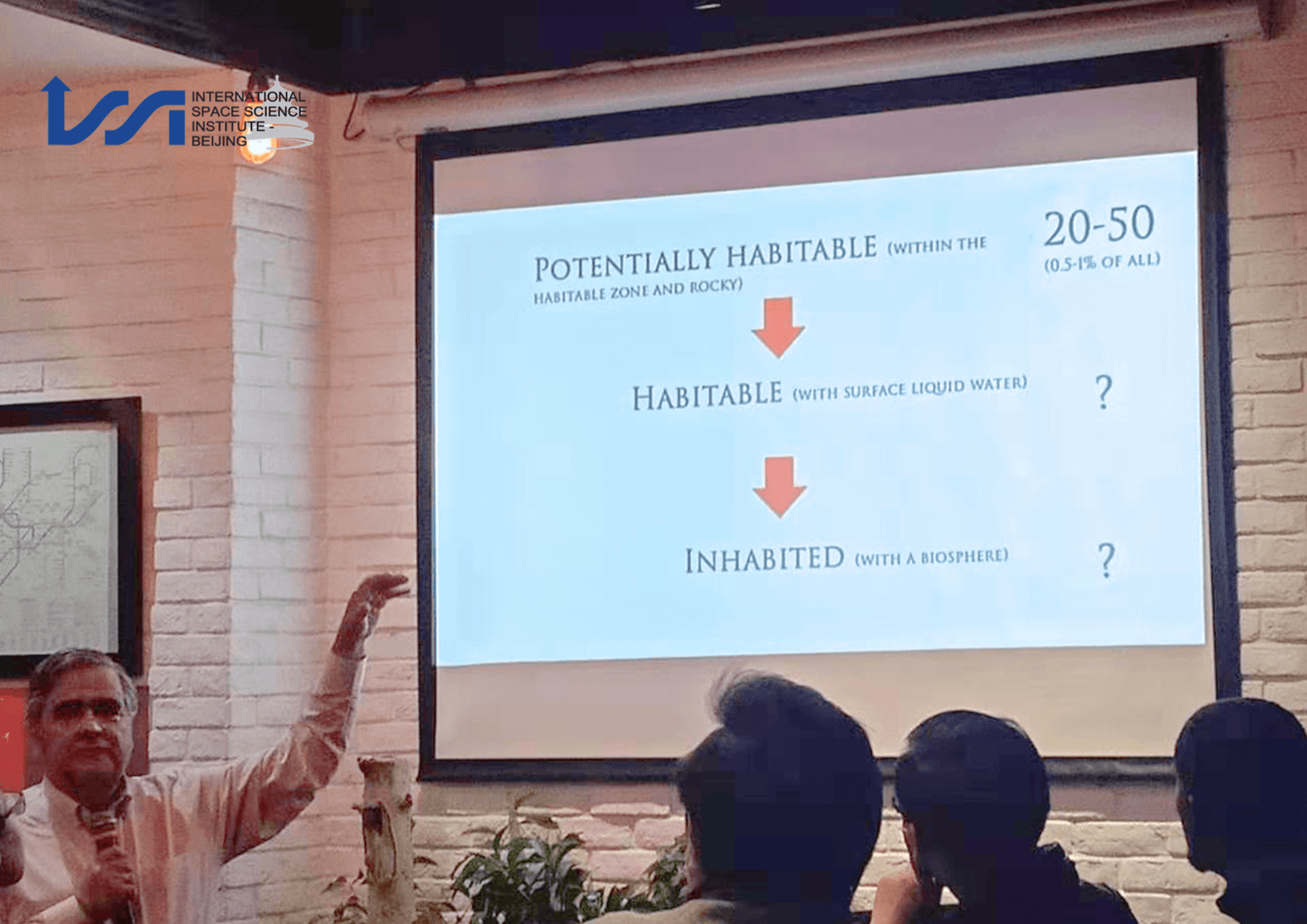Understanding Science Seminar
“Life in the Universe”
Exploring the space to know our origins
BEIJING, CHINA — On Thursday, December 5, 2019, Prof. Alvaro Gim nez, the current Director General of the Foundation of Spanish National Research Council (CSIC, Spain), gave a lecture on “Life in the Universe” at TusStar Coffee in Haidian District, Beijing. As part of the Understanding Science seminar series jointly organized by the International Space Science Institute–Beijing (ISSI-BJ), the UK Royal Society of Chemistry (RSC), and Beijing University of Chemical Technology, the event aimed to attract non-experts to reflect on space science-related questions with the help of an experienced scientist.
Figure 1 Prof. Alvaro Gim nez, Director General of the Foundation of the Spanish National Research Council (CSIC)
The interest in the mysteries of our galaxy, of the interstellar space, and of our universe spans across time and space. Given the many still unsolved questions and enigmas concerning our cosmos, it is no surprise that researchers spare no effort to conduct deeper investigations on our universe and its laws. Considering the climate changes that are affecting our ecosystem and the future of our planet, the fascination towards space science-related topics has grown, leading not only to increased research but also to copious artistic productions and imaginative suppositions regarding other forms of life and the future of humankind in the universe.
Despite the scientific (il)legitimacy of these conjectures, they all aim to quench our thirst for knowledge concerning our universe and for answering some popular yet essential questions, such as:
- What is life?
- Did life emerge by necessity or by chance?
- How will humankind evolve, and where?
- How will our planet and the solar system evolve?
- Are we alone?
To address these questions, Prof. Gim nez introduced the audience, ranging from senior scientists to students, professionals, and non-experts, to the origins of the universe and in particular, of life in the cosmos which is commonly traced back to over 3,500 million years ago. After defining life as a self-sustaining chemical system capable of Darwinian evolution, Prof. Gim nez explored the three main ingredients that represent the essential factors for life to arise, i.e. organic compounds, liquid water, and a source of energy.
Hitherto the Earth represents the only planet in the solar system which can present liquid water on its surface, but are these the only necessary factors for life to emerge or did life appear merely by chance? In order to analyze this interrogative and challenge such theory some forms of life that survive and exist in extreme conditions — harsh temperatures, pressure, pH — were mentioned, such as the organisms discovered in the R o Tinto, Spain, 'Red River' in English, and in the Gunhuver hot springs, Iceland, or the ecosystem found 2.8 kilometers underground in the Mponeng Gold Mine near Johannesburg, South Africa.
Similarly, even though the surface of Mars does not appear to provide a fertile ground for life to appear, the discussion on life on Mars is ongoing both in scientific and non-scientific circles. In fact, 4 billion years ago Mars presented some conditions which could have made life possible, and this leads to the unavoidable necessity to explore what lays beneath its crust.
Figure 2 The major stars close to the Earth
As the talk went deeper into the topic of life in the universe, the debate also moved further from the earth and outside of our solar system, as Prof. Gim nez introduced Exoplanets, i.e. planets outside of the Solar System, which possess completely different characteristics from the ones visible in our system. Given the 4120 exoplanets currently known as well as the soon to-be-concluded interstellar mission of the Voyager 2 probe, the interest in the interstellar space and the related missions has peaked, bringing us closer to some compelling questions on life in the universe, such as if there is life on other planets outside of the Solar System and under which conditions it can arise. As illustrated by Prof. Gim nez, we are aware that around 20-50 exoplanets are potentially habitable (only 0.5/1% of the total number), but we still grope in the dark regarding the existence of habitable planets — with water on the surface — or already inhabitable ones, i.e. with a biosphere.

Figure 3 Prof. Gim nez on Exoplanets
Following the Fermi Paradox, which outlines the apparent contradiction between the lack of evidence for extraterrestrial civilizations elsewhere in the Milky Way galaxy and various high estimates for their probability, the talk was concluded with some suggested theories on the existence of life on other planets, ranging from other forms of life’s lack of interest in communicating with us to the extreme difficulty for them to reach the Earth.
As the lecture was concluded, several questions of different kinds were brought up and exhaustively answered by Prof. Gim nez.
The full video of the lecture is available here.
For more info on our Understanding Science lectures, please follow the official Wechat account
---
For inquiries and questions, please contact ISSI-BJ PR and Editorial Manager Laura Baldis
laura.baldis@issibj.ac.cn